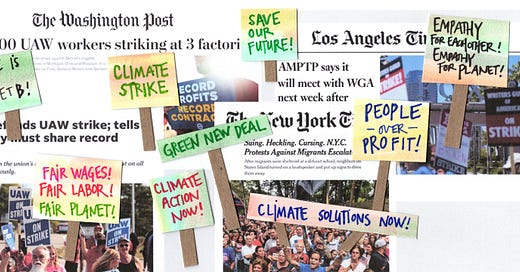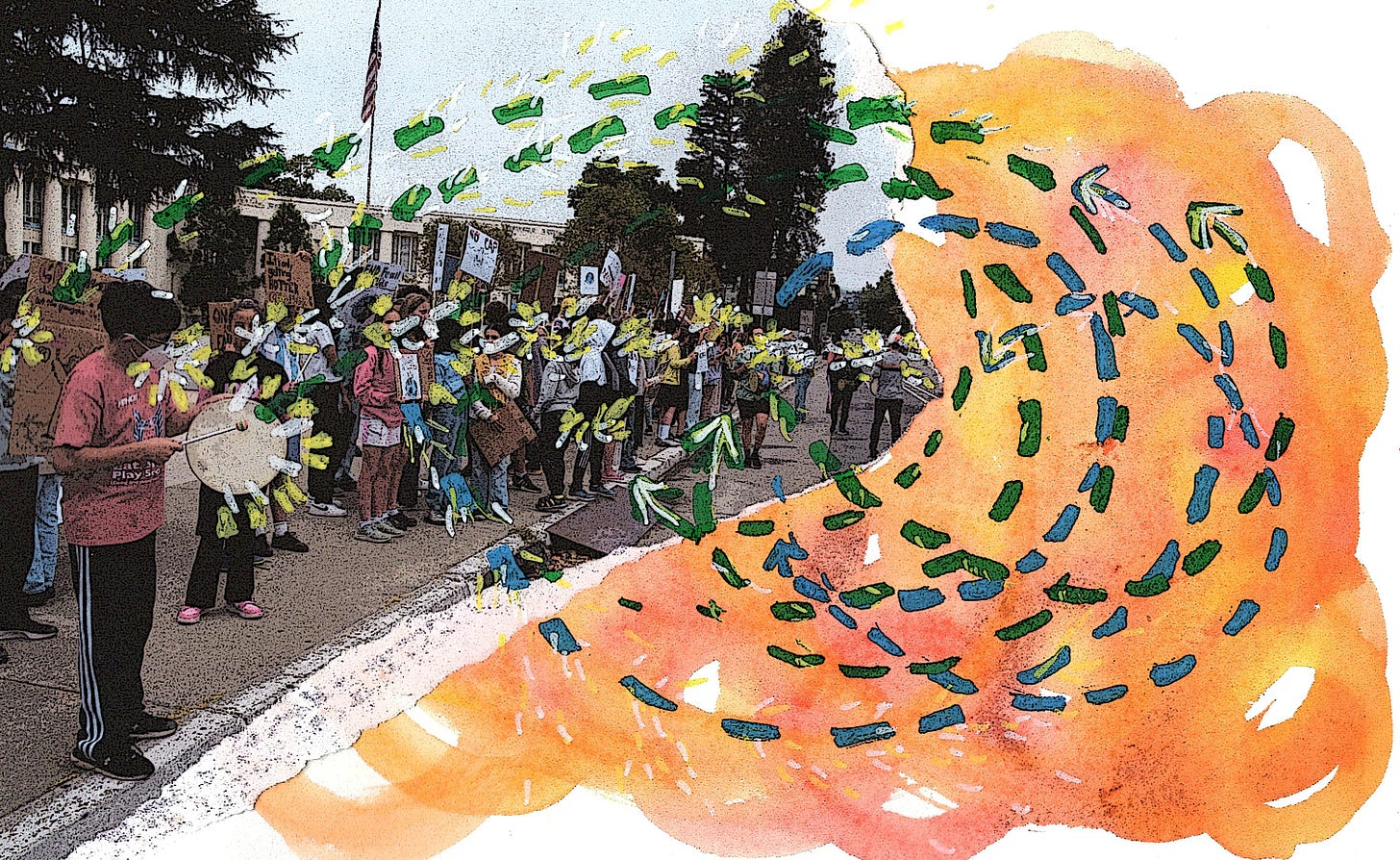All the strikes are climate strikes
Advocacy as regeneration for the greater good, and for finding one's voice
Last Friday, I dropped my kids off at school so they could immediately head out of school and onto the streets as part of the Global Climate Strike. While I fully support their efforts and cause, I couldn't help but sigh. Would anyone care? Would it do anything? We live in one of the most progressive cities and states in the US that already has done more than most in terms of transit, EVs, electrification, food deserts, climate justice, and more. Yet their actions are not just about getting other people to act on their protest signs and change behaviors - their march was also about teaching them, as young kids, to speak up and advocate for a better future on our planet. They had outward messages on their signs, chants, and block-long parade they created. But there was also an inward message teaching them to share their voice.
Despite the international call for a climate strike last Friday, it wasn't anywhere in the US news. Most headlines in the US covered another strike happening simultaneously - the United Auto Workers (UAW) strike. Other headlines continued to cover the ongoing Writers Guild of America (WGA) strike. While not a strike, protests over migrants in New York City filled other headlines.
With so many strikes happening at once, it begs the question, what's broken? The answer is the system. And in some ways, all of these strikes are climate strikes.
United Auto Workers are fighting for wage increases matching top executives' raises over the last four years. The inequality of wealth and power is one of the leading causes of the climate crisis - when the few at the top make decisions that control and disempower the masses for the sake of their wealth, not the health of the planet or the population. It's not just the pay of the autoworkers that is disproportionate but also the effects of pollution from factories, oil refineries, and highways filled with smog. Some might even trace the history back to GM systematically buying street car lines to replace public transit with cars and buses. These issues of inequity sit at the heart of the Environmental Justice issue.
The Writers Guild of America and other Hollywood units are also striking over inequity in pay and healthcare and rules around when and how TV and film studios can use AI to write content. When we replace human interaction - whether through collaboration with co-workers or in the content we consume - we reduce our empathy for one another. When we see each other not as human but as "other" (whether that's a machine or simply someone not like us), we are less likely to care for them. The threat of AI writing content is not just in taking jobs away but also taking our ability to work with one another, to relate to one another as humans, and to empathize with one another - which is also intertwined with the climate crisis. It's easier to buy clothes made from sweatshop labor when we don't see the workers or their conditions. It's easier to dump our trash in places we don't live. When we divide into seeing "others," we forget we live on a shared planet.
The "othering" of people who don't look like us is precisely what causes fears leading to those who also made headlines last Friday when they protested migrants being allowed into New York City. (There is a sad irony, of course - America, the land of immigrants, in the city with the Statue of Liberty, a symbol of immigration, has people protesting this very act. The difference, of course, is that these migrants don't look like them, and did not arrive in the US as many of their ancestors did.) The migrant crisis is not unique to the US, and similar struggles can be seen in affluent countries worldwide. Many of the reasons behind recent waves of migration is because of climate change. What if, instead of saying, "close the border," we said, "let's create climate solutions that will help people survive and thrive around the world?" Continuing to live so that we increase global temperatures, destroy ecosystems, and monopolize resources and wealth will only create more reasons for people to flee to more affluent countries. Closing the border does not address the root cause of why so many people are fleeing. If we looked closely at where some of those root causes are - it's in the behaviors of wealthier countries driving up temperatures.
It could be the same reason that here in the US we didn't see the climate strikes in news headlines when others worldwide did. All too often, it is those living in places like the US, where we drive more, consume more, and waste more than other countries, that we want to avoid facing the fact our behaviors drive climate change. Just as the top executives don't want to share their pay with lower workers - many in the US don't want to give up their wasteful lifestyles for the sake of others, even though we depend on them to function.
When we strike, we call out the value of our work in the absence of work to others. The impact is often felt the most when those most vulnerable are affected. When healthcare workers strike and patients can not get help, or when teachers strike and schools are closed. This is not to diminish many others who strike. Many are impacted by the current writers' strike, whether because of job loss, studios closing, or simply longing for their favorite show to return. Strikes can make visible the invisible work that keeps things going. Perhaps the most famous example is the Memphis Sanitation Strike, when tens of thousands of tons of trash were not picked up, sewage was not emptied, and the extreme conditions of sanitation workers' jobs were made visible.
However, the inward action is just as crucial as these outward signs to others (either via labor stoppage or visual sign of protest). When those who strike say, "the collective is more important than myself'. It's more important to stand up for workers' rights than get a day's pay. It's more important to advocate for climate change than to do our lesson as planned today. It's more important that we advocate for our greater good as a whole than me as an individual. This was what I had to remind myself was part of what my kids were learning in their action to join the climate strike.
A strike can be regenerative in getting others to join your cause, but also in building up one's voice of advocacy.
As I write this, I notice some irony in that it has been two months since I last published on Substack - my longest break in posting. While I wasn't on strike and didn't intentionally take this long of a break in writing, I was on a break. There was an extended family vacation, the arrival of a new puppy, and a number of excuses for why it took so long for me to finish the final chapter of my book and get it sent to the publisher. Breaks are essential for rest and reflection. Earlier this year, I wrote about the need for intentional rest and intentional regeneration. Strikes, when done thoughtfully, allow us this break and reflection so that our work can regenerate again.
One of my favorite analogies to describe regenerative design is regenerative brakes in electric and hybrid cars. When you press the brake pedal, more charge is created in the battery. When you break, you can go further. The hope of those striking is that their brake creates more energy for the collective - whether that be in amplifying the message, making the importance of their work visible, or finding the energy in oneself to speak for a greater good.





